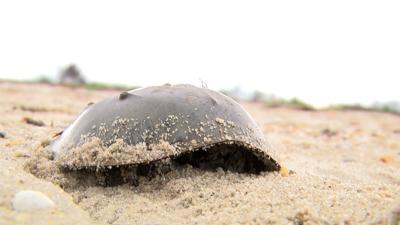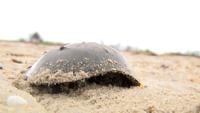MILFORD, DE- As Memorial Day weekend marks the unofficial start of summer, Delaware beaches are filling up—not just with people, but with horseshoe crabs and shorebirds, too.
At the DuPont Nature Center on Friday, dozens of people gathered to learn about the ancient creatures that return to Delaware’s shores each spring.
Kayla Gonzon, with the DuPont Nature Center, led the season’s first public presentation. She said each year, tens of thousands of horseshoe crabs come ashore to spawn.
“The horseshoe crabs come up here every season around every year around this time. So May and June to lay those eggs. And then those shorebirds come and they eat those eggs."
The Delaware Bay is home to the largest population of horseshoe crabs on the East Coast.
This season, Gonzon said an estimated 40 million males and 16 million females are nesting in the bay.
“Each season they will lay between 80,000 and 100,000 eggs on our beaches and at one time. So they'll spawn many times throughout their season. But at one time they're laying 4,000 eggs."
These ancient creatures have survived nearly 445 million years—predating dinosaurs and even trees.
Patrick Ruhl, manager of the DuPont Nature Center, said horseshoe crabs are crucial to both Delaware’s ecosystem and human health.
“They're incredibly important to humans, and they have been for centuries. We used to use them for fertilizer... They're used in the public health sector to keep us healthy literally every day."
While Friday’s presentation focused on the crabs’ biology, Ruhl said it also highlighted their broader importance—and the need for public awareness.
“I think a lot of Delawareans just aren't aware of how close we are and how important our backyards are to the rest of the world,"
Gonzon said that’s exactly why the DuPont Nature Center holds events like this—to educate both visitors and locals about the species and the beaches they depend on.
"It's really important to protect them because the Delaware Bay is a vital habitat for these horseshoe crabs."
Gonzon added that one simple way beachgoers can help is by flipping over stranded crabs that may get stuck on their backs.
“We want to remind people that if you see a horseshoe crab flipped over, flip it over like a pancake by the sides of the shell. What you don't want to do is grab it by its tail."
The DuPont Nature Center says more public events are planned in the coming weeks. For more information, visit the center’s website.



